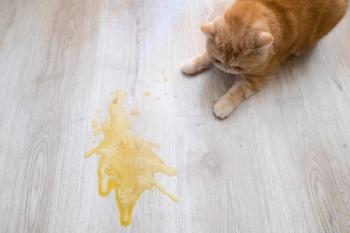
AHC Summit to explore welfare
DENVER—The American Association for Equine Practitioners (AAEP) is bringing industry groups together to discuss the welfare of the country's so-called unwanted horses.
DENVER—The American Association for Equine Practitioners (AAEP) is bringing industry groups together to discuss the welfare of the country's so-called unwanted horses.
The AAEP will host the Unwanted Horse Summit April 19 during the American Horse Council's (AHC) annual meeting in Washington, D.C.
"The AAEP has been geared toward welfare since its inception," says 2005 association President Scott E. Palmer, VMD, New Jersey Equine Clinic in Clarksburg. DVM Newsmagazine sat down with Palmer during the AAEP's golden-anniversary convention. "We're uniquely positioned to administrate welfare initiatives because our information base and personnel are in strategic positions around the country."
The AAEP's Board of Governors approved $25,000 to fund the summit, where industry leaders from dozens of organizations with an interest in animal welfare will converge on the Capitol for AHC's legislative updates and discussions with legislators.
The AAEP considers the summit as the first step in identifying the many factors that contribute to the number of unwanted horses in the United States and Canada.
The summit will focus on responsible horse ownership and breeding; long-term care options; and affordable and accessible means of humane euthanasia. The event also will include an opening educational segment devoted to the plight of the unwanted horse, and the association will send formal invitations to major organizations representing breed groups, sport and discipline organizations, rescue and retirement facilities, veterinary associations and welfare groups.
"We want to gather all the stakeholders in the industry to balance representations," Palmer says.
Slaughter semantics
Part of the debate will revolve around the American Horse Slaughter Prevention Act. The proposal never made its way out of committee in the House of Representatives, so the measure must be reintroduced during the next session of Congress. The 109th Congress took office in January.
The industry is widely split on the legislation. The Senate version of the proposal (S. 2352) intends "To prevent the slaughter of horses in and from the United States for human consumption by prohibiting the slaughter of horses for human consumption and by prohibiting the trade and transport of horseflesh and live horses intended for human consumption, and for other purposes." Palmer says the "for other purposes" clause might inhibit legal horse sales, and the AAEP—as well as the AHC—remains neutral on the issue.
"The AAEP is not going to determine whether or not it's right for people to eat horse meat," he says. "There will never be an industry consensus about the viewpoint of slaughter, but we still can come together to determine what to do about the unwanted horse. That issue remains whether the legislation passes or not. A law might change the nature of the problem, but it doesn't change the problem."
About 50,000 horses are slaughtered in the United States each year, according to the AAEP. Canada slaughters about 28,000 each year, and Mexico slaughters about 3,000. About 10 percent of slaughtered horses in the United States come from the racing industry, but the majority originates from the West and Midwest, Palmer says. The cost of maintaining a horse is about $1,800 per year for food and basic care.
Controls on feral horses were loosened in December when the fiscal year 2005 Appropriations Bill was signed into law with a rider authorizing the thinning of America's estimated 37,000 wild Mustangs.
The Bureau of Land Management (BLM), which regulates the animals, did not ask for the amendment to the Wild Horses and Burros Act, says Nicole Lamoureux, CEO of AHC's Washington office, which houses four full-time lobbyists.
Sen. Conrad Burns, R-Mont., attached the language on the eve of the vote, reportedly on behalf of other Western-states senators. The majority of the country's wild horses and burros reside on public lands in the West with many in Nevada. Nevada Sen. John Ensign, DVM, voted nay on the appropriations bill.
The addition to the 1971 law permits BLM to sell between 10,000 and 14,000 animals.
"Any wild horses that are more than 10 years old and have not been successfully adopted after three attempts 'shall' be sold at auction," says Robin Lohnes, executive director of the American Horse Protection Association in Washington. "I've been working on BLM issues for 18 years, and I've seen sale authority reincarnate itself on several occasions."
The Wild Horses and Burros Act prohibited the sale of BLM-managed animals to slaughter, but the newly passed amendment rescinds that restriction.
Ironically, on the same day Congress sent the president the appropriations bill, it also sent him legislation designating Dec. 13 as the National Day of the Horse. He signed that one, too.
Palmer's other main goal is to expand the AAEP's continuing education outside the United States. The association has more than 6,500 members in 57 countries, and the group is uniquely positioned to bring its branded CE to outlying members, Palmer says.
He also plans to recruit international members more aggressively, establish a program that allows live CE in Europe via streaming video, and bring long-range CE to Hong Kong and Indonesia.
Newsletter
From exam room tips to practice management insights, get trusted veterinary news delivered straight to your inbox—subscribe to dvm360.




